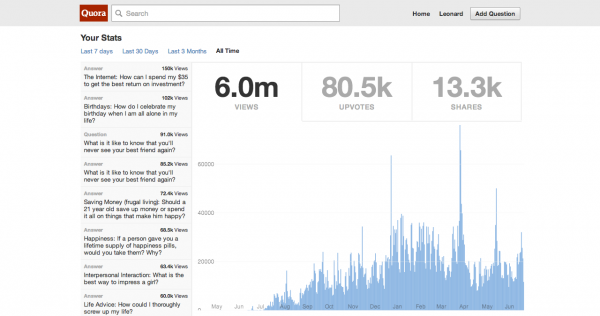Someone on Quora asked:
Why should I provide my knowledge to Quora for free?
This was my response:
Quora is a knowledge market where some of the most profound questions are answered by some of the most brilliant minds known to man, from scientists to astronauts to PhD’s, attorneys, venture capitalists, angel investors and engineers.
Great, now that we know what Quora is, why should I provide my knowledge there for free?
Remember when your parents told you not to touch the stove because it was hot, but you did it anyway? Or a similar situation in the same context?
We acquire knowledge much faster than we acquire wisdom.
Knowledge is kind of useless, unless you know how to utilize it or implement it into your daily life.
Value is in the eye of the beholder.
Whomever wrote this question lives with the perspective that, in the land of the blind, the one eyed man is king.
We’re no longer in the industrial age, nor the cold war era where that was once true. In the information age, data is readily available everywhere. We can go out and acquire all the data we want, but will that make us any wiser?
No.
What good is a blueprint if you don’t have the machinery necessary to create the outlined bridge?
Pretty useless.
If you have the machinery and the blueprint, would that make life any easier if you don’t know how to operate the machinery?
Absolutely not.
So, you have to think… Is it fear of competition that prevents people from sharing their life experiences? Is it selfishness? Is it insecurity that someone else may be able to better utilize the knowledge we had personally attained?
Well, in the information age, Darwinism has ceased to exist. The ecosystems that flourish the most are socially conscious and are built with the emphasis on helping the lives of others. Not the ones that are built to compete and destroy each other.
The question really boils down to, would you rather have the world be a better place by inspiring others to take charge of their lives and try to implement something that could potentially shift our reality and our future? Or would you rather hoard that information for yourself so you can use it for selfish reasons.
Real life experiences creates wisdom. Data is just data. My knowledge won’t be of any help to you unless you can compare it to your personal experiences.
Especially on a site where so much data is just readily available, it is usually taken for granted. People tend to value more of what they research out as opposed to what they find right at their finger tips. The scarcity of the “prestigious” advice is gone, as it is now just at the touch of our finger tips.
However, if you are a highly motivated person, who has been through many various experiences in life, you may potentially see the true value behind the words that are written out.
But then… You have to consider, that with the internet, is anything really even true? Sean Parker was just nominated public enemy number one in the eyes of the public. The first since Bernie Madoff. What has Sean Parker even done that has caused damage to our society?
Nothing.
In actuality, he helped pave the way for most of the ecosystems we have now.
However, no matter how untrue the story of his wedding was portrayed to be, it will live on.
Try deciphering truth like this in an unregulated wilderness, where 50% of the data in our online ecosystem is true and the other 50% is false. It won’t be easy. But the people who do their due diligence will be better equipped to know what is in actuality, useful, and what isn’t.
P.S. If you’re lucky, you might just be able to get 6 million views on your content in a year like I did.

—
Originally posted on Quora.
Leonard Kim is Managing Partner at InfluenceTree. At InfluenceTree, Leonard and his team teach you how to build your (personal or business) brand, get featured in publications and growth hack your social media following.
